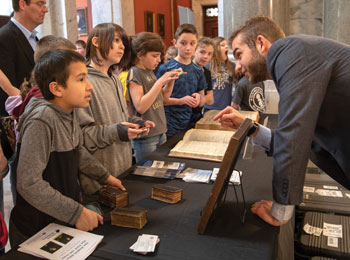Capitol exhibit features 500-year-old Tyndale Bible
FRANKFORT—The women peered into an acrylic case marveling at the ancient book inside—a 16th century Tyndale New Testament—one of only about 10 in existence.
“Would you like to hold it?” asked David Parsons, owner of the Bible.

Their eyes widened with surprise as a chorus of “really?,” “yes” and “please,” sprang forth.
Parsons, founder of Truth Remains, set up more than a dozen Bibles on display at the Kentucky State Capitol, but said the Tyndale Bible was his crown jewel. The rest of his collection continued a tour through the first 100 years of English translation Bibles, including a 1537 Matthew’s and a 1539 Great Bible.
“Bibles dated pre-Mary I of England are really rare,” Parsons said. “There were very few that had actually been printed and when she came to the throne, she had them destroyed. These survived.”
As visitors carefully held the 500-year-old Tyndale Bible they remarked on its diminutive size. It fit neatly in the palm but was several inches thick with layers and layers of weathered pages. An ideal size for smuggling in a ladies’ dress pocket or tucking in a man’s waist band, Parsons said.
“I was afraid to touch them out of respect and reverence,” said Troy Logsdon of Shelbyville.
About 90 percent of households in the United States own a Bible, according to the American Bible Society, and on average those households have at least three. But such was not the case when William Tyndale began illegally transcribing the original Greek New Testament into the English language. Possession of God’s Word not only belonged to church, it was locked away from the common man in a language known only by clergy and scholars: Latin.
“Tyndale’s objective was to, as he put it, allow the plowboy or simple man out in the field to know the God of the Bible and ultimately the Lord Jesus Christ,” Parsons said.
Forbidden to translate the Bible in England, Tyndale sailed to Germany to begin his work.
He secured a printer but soon after the establishment was raided by opponents to the Protestant Reformation. Tyndale pressed on and found another printer. As thousands of English language Bibles were smuggled into England, religious leaders did everything they could to destroy them. The archbishop of Canterbury resorted to buying up as many copies as he could get hold of to destroy, but his actions only further funded Tyndale’s operation.
Farmdale Baptist Church Pastor Steve Weaver said Tyndale’s translation “was not only how you learned the English language; it was why you would learn the English language—to read the Bible.”
Weaver, who serves as Kentucky’s Capitol Commission State Pastor, invited Parsons to exhibit his Bible collection at the statehouse “to be a blessing” and show his appreciation to the community of legislators and government employees who work there. Last year, he hosted an exhibit of ancient Hebrew scrolls in the Capitol.
“It also provides the opportunity to have an underlying message of the truthfulness of God’s Word, of God’s faithfulness in preserving his Word and the sacrifices that were made so we can have the Bible in the English language,” Weaver said.
Language was in a state of flux in the 1500s as Middle English evolved into something more similar to the modern English language of today. During this period, Tyndale was coining new words to express concepts in the Greek Bible that did not exist in the English language, such as beautiful and scapegoat.
“Spelling and language were really fluid during this time, but Tyndale’s translation locked it in and is still impacting us hundreds of years later,” Weaver said.
Experts say an estimated 90 percent of the King James New Testament comes from Tyndale’s translation.
“These English Bibles are a part of our history as English speakers,” Weaver said. “This exhibit has historical, literary and artistic value, even for an unbeliever.”
Tyndale had plans to translate the Old Testament into English as well and got as far as the Pentateuch, the first five books of the Bible, before he was arrested. For his crime of making God’s Word accessible to the common man, Tyndale was imprisoned and sentenced to death by strangulation and burned at the stake.
“We are indebted to him for without his translation of the scriptures we might all be lost,” Parsons said. “No book has been more criticized, more attacked and yet it survives through every time period, every generation as the most relevant book that has ever existed.”
Robin Cornetet